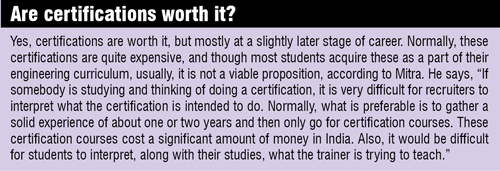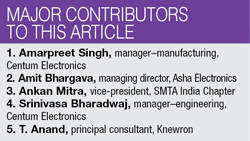Centum Electronics recruits as well as encourages fresher engineers to work on their state-of-the-art SMT lines. Srinivasa Bharadwaj, manager-engineering, Centum Electronics says, “As the SMT machines involve understanding of electronics assembly processes as well as maintenance of the pick-and-place equipment, where a lot of mechanical movement of the parts is involved, we prefer to have engineers from electronics and mechanical streams. Engineers from electrical stream also fit in.”
Why a career in SMT
Fresh engineers interested in learning equipment functionality and process engineering are suitable for SMT lines. In addition, engineers with an aptitude of equipment maintenance can also take up the job of an SMT engineer. Singh says, “As it is the core of an electronics manufacturing industry, there is a lot of focus on the technological developments in this area. This makes it more interesting and challenging for any of the fresh engineers to take up SMT as a career option.”

According to Singh, SMT forms the back bone of electronics assembly line and is therefore a very important area for an electronics manufacturing plant. He says, “Though there is a requirement of experienced engineering resources running SMT assembly lines, it is very important to have a significant pool of fresh engineers working on SMT lines too.” To that Bharadwaj adds, “Engineering graduates with a good aptitude for learning basic manufacturing processes like screen printing, solder-paste inspection, pick and place, reflow soldering and automatic inspections are preferred. It is very challenging for a fresh electronics engineer to work on fully-automatic computer-controlled equipment. The industry offers various roles, which include responsibilities like process engineering and equipment maintenance of the SMT lines.”
What an SMT engineer learns
Talking about the exposure for an SMT engineer, Singh shares, “Since SMT assembly is the core of electronic assembly, an SMT engineer gets exposed to critical process areas like tooling design (such as stencil, palettes), pick-and-place programming, reflow profiling, AOI programming and x-ray inspection.” Shifting to the equipment side, he adds, “Here, the areas where an engineer would get an insight into are breakdown maintenance, equipment effectiveness, equipment capabilities and new equipment selection, to name a few.”
Learning about statistical process controls for critical processes like solder-paste printing, for instance, using very-high-end inspection equipment is another interesting area in SMT. “SMT first-pass yield is critical in electronic assembly. Hence, invariably, the SMT engineers have to learn about the process to bring in yield improvements. Therefore there is opportunity to learn and use statistical techniques to bring forth yield improvements,” informs Bharadwaj.
for instance, using very-high-end inspection equipment is another interesting area in SMT. “SMT first-pass yield is critical in electronic assembly. Hence, invariably, the SMT engineers have to learn about the process to bring in yield improvements. Therefore there is opportunity to learn and use statistical techniques to bring forth yield improvements,” informs Bharadwaj.
Aptitude, right attitude and soft skills
According to Anand, for SMT-assembly and manufacturing-based jobs, people must have practical experience in soldering. He informs, “Even a fresher should not only have worked during his college assignments but even otherwise have practiced enough to demonstrate that he is interested in this domain. Assembly, troubleshooting and testing are some of the widely sought skills for this domain.”
A good understanding of basic electronics is required. Mitra says, “It’s not just the engineering degree, a potential candidate needs to understand how a design looks like and how to interpret the design so that during manufacturing, in case there are some issues, these can be reported. That’s the kind of value add that people look for in profiles of the engineers.” He adds, “There are also multiple industry certifications that recruiters tend to look at. There are some certifications that engineers might have acquired in the past which could help them stand out among other candidates.”
From a product-development perspective, physics and engineering tool knowledge are extremely important, informs Nande. He says, “If you are on the manufacturing side, obviously process and supply-chain knowledge is useful. Increasingly, soft skills and good communication skills are also seen as differentiators in promoting engineers to managerial cadre.”
Demand areas
According to the data provided by TimesJobs.com, the top industries hiring engineers are in the manufacturing and engineering sector with about 28 per cent share of jobs, followed by the IT-software/software services sector with a share of 26 per cent. IT-hardware/semiconductor and healthcare/biotechnology sectors provide 15 per cent and 12 per cent of the jobs, respectively.







My Qualifications 12th MCVC Electronics with ITI Electronics & 8 years experience in electronic company. Skills : Hand soldering SMD component related jobs
My Qualifications Diploma Electronics & instrumentation with Electronics & 8 years experience in electronic department as technical assistant . Skills : Hand soldering ,PCB based,SMD component related jobs
I did btech in 2011with ECE stream, but i join fmcg business after that. But now i want to start back my career in electronics field. Suggest me and drop message on whatsapp +917351796318
I did btech in 2011with ECE stream, but i join cement manufacturering plant after that. But now i want to start back my career in electronics field. Suggest me and drop message on whatsapp +918885380387